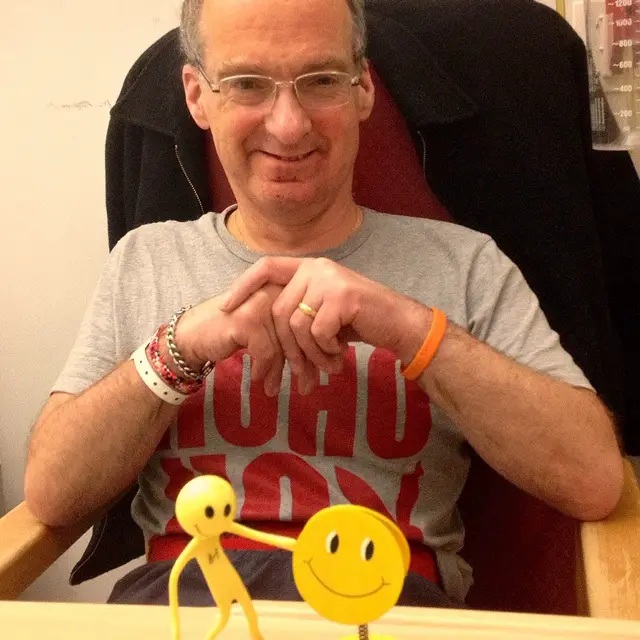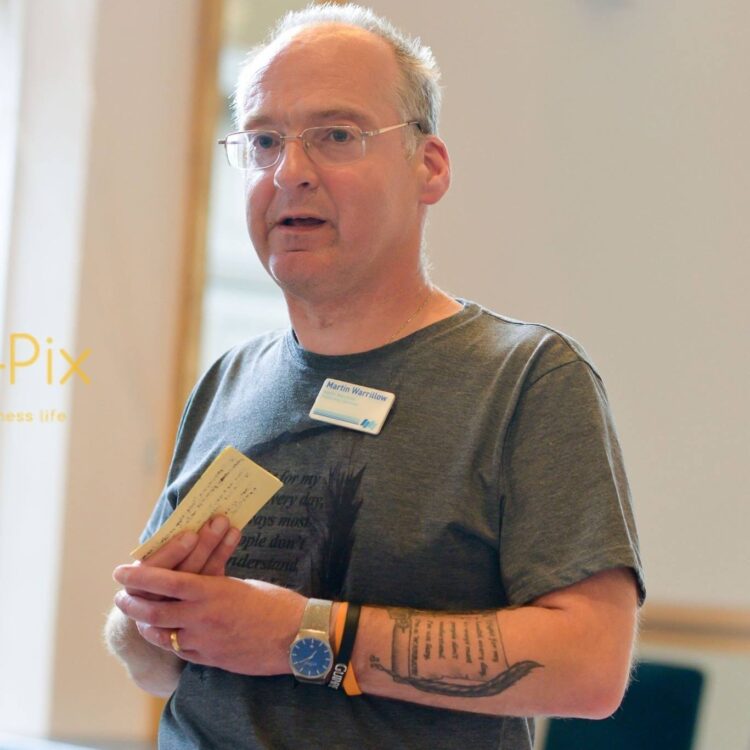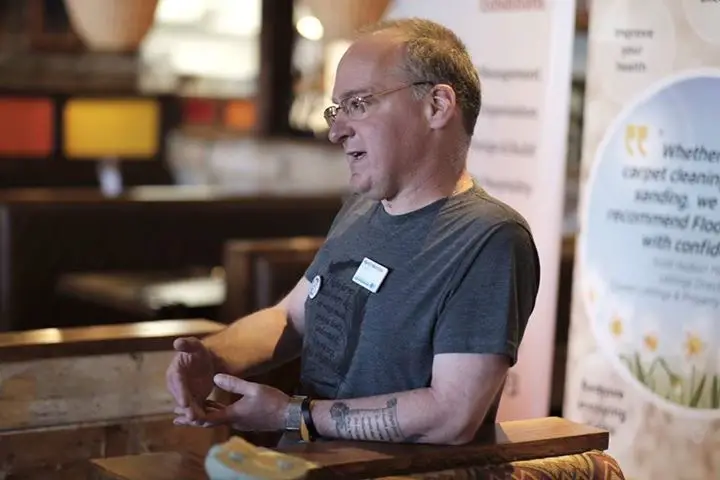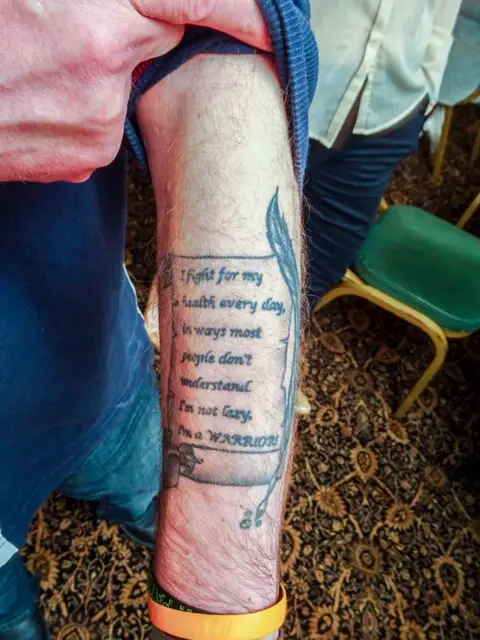
Stroke survivor turned blogger, public speaker and podcast star
A sudden stroke turned Martin Warrillow’s life upside down. After recovering, he chose to share his journey to help folks understand strokes better and support those facing alike challenges. Discover his blog, speaking gigs, and podcast adventures.
Ever had an atomic bomb go off in your head? I have – or at least that’s what it felt like when an artery burst in my brain at just after 3 pm on Monday, December 16, 2013.
I was crossing a busy road at the time. I looked left, looked right, made sure the coast was clear, took two steps into the road… then collapsed as that atomic bomb exploded.
It left me paralysed down one side, lying in the road, unable to move. That would have been bad enough… but then I saw a double-decker bus pull out of a bus stop about 20 yards down the road. I still don’t believe the driver saw me because I was in his blind spot. I vividly remember lying under the rear-wheel arch of the bus as it missed me by the slimmest of margins.
A passer-by saw me, dragged me into a shop and called a paramedic. He did a series of tests then announced, in that matter-of-fact-way that medical folk have: “I think you’ve had a stroke, you need to be in a hospital.”
Processing my new circumstances
I was 49 years old. A journalist since March 1986, I had just been replaced as the freelance editor of a magazine. The people I was working for told me they, “Wanted to go in a new direction” and I wouldn’t be getting another one-year contract. They told me that devastating news in a two-minute phone call at 7 pm on Sunday, December 1.
Was it any wonder that with 90% of my income gone, I stressed so much over the next fortnight that I had a stroke?
My first reaction was: “I’m 49. I can’t have a stroke. Strokes only happen to 80-year-old grans.” But I was blue-lighted to a hospital where scans confirmed that my life had changed in an instant. My journalism career was overdue to the memory-loss, cognitive issues, extreme fatigue and other side-effects of the stroke.

I spent a month in hospital (over Christmas) trying to process my new circumstances. The paralysis disappeared after a fortnight. But I still had to undergo months of intensive physiotherapy as I tried to learn to walk and talk and use my damaged left side.
I was in a wheelchair for four months, housebound for eight months and had to walk with two sticks for nearly 18 months. But at least I was alive and I soon began to take the view that the bus had missed me for a reason. I felt that I could help make people aware that strokes can happen to anyone of any age and that stress can be a major cause of strokes.
Sharing my stroke story

So I decided that, despite the fact that my 80wpm shorthand had to be replaced by one-finger typing using my healthy right hand, I would start a blog about stroke and stress-awareness.
Going under the name of The Warrior (originally a mispronunciation of Warrillow but scarily representative of my fighting spirit), I would write about the daily difficulties of being a stroke-survivor and try to provide a resource for other people going through similar experiences.
If reading it makes one more person aware of how prevalent stroke is and of the devastation it causes, I’m happy.
Stroke changes you in a million different ways; oddly, not all of them are detrimental. Prior to my stroke, I was a relatively shy and reserved person. I was an office-bound sub-editor rather than an out-in-the-field reporter throughout my journalistic career because I wasn’t that comfortable talking to groups of people.
But if I was going to get my stroke-awareness message out there, I would have to talk about it. Just writing a blog wouldn’t do the job sufficiently.
Becoming a motivational speaker
So I started doing talks at business networking events; speaking frankly about my story, about my life as a stroke survivor. As I put it now, “I scare people” into thinking about stroke, the dangers of stress and the need to plan (especially in financial terms) for the life-changing event that will always happen to someone else.
I’m living, breathing, proof that a stroke can happen to you, whatever your age, whatever your state of health.

I’ve done hundreds now. Standing in front of a room full of people and telling them my story is fun for me and educational for them. As with most disabilities, stroke doesn’t touch most people’s lives until a friend or family member goes through it.
The Warrior Podcast
In spring 2018, I added another string to my stroke-awareness bow. A business friend introduced me to the world of podcasting and The Warrior Podcast was born. Every month, I talk to stroke survivors, those with a professional interest in stroke, or experts in stress-awareness.
So far, it has been downloaded just short of 5,000 times in nearly 30 countries and those who do download it listen to 80% of each 25-minute episode on average.
Those who understand these things tell me those are ‘staggering’ figures for a home-produced podcast which gets very little publicity. Should you want to hunt it out and listen, it’s at The Warrior Podcast and available on iTunes, Spotify and all good podcast providers.

I’ll keep doing what I do because the incidence of stroke among working-age people is going up hugely. No longer is it something which only affects your 80-year-old gran. As I tell people when I speak, living with the million problems (some trivial, some dangerous) that stroke-survivors face every day is not fun.
If just one person changes their lifestyle, reduces their stress, improves their work-life balance and avoids a stroke because of what I do, it’s worth my effort.
To find out more about Martin and to read his blog, visit Ask the Warrior.
By Martin Warrillow
More on Disability Horizons…
- 5 assistive technology to create a smart home
- Using writing as a way to free yourself and increase disability awareness
- Disabled entrepreneur Josh on his invention to help wheelchair users travel more easily
Originally posted on 17/07/2019 @ 2:58 pm